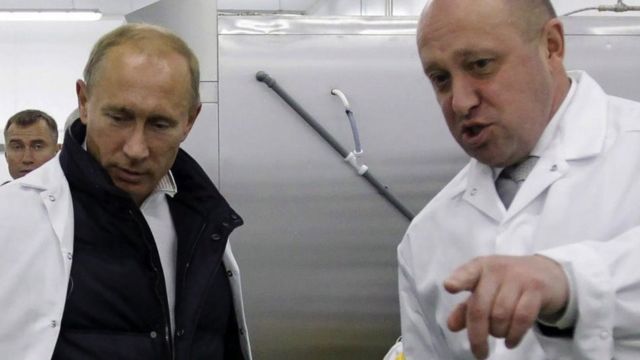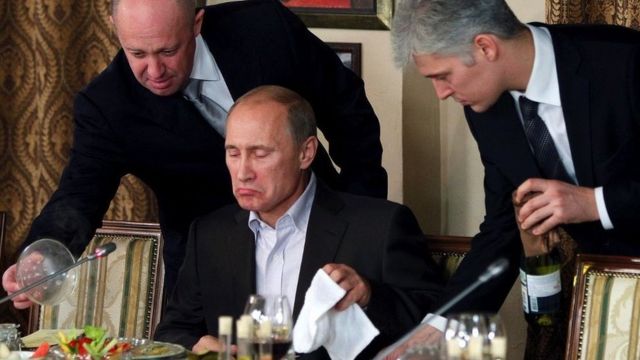The Wagner group in Russia has been talked about a lot after its former commander took refuge in Norway, saying that he fled the war in Ukraine after witnessing war crimes.
It was necessary for the head of this group, Yevgeny Prigozhin, to issue a statement denying the man’s claims, but this does not prevent him from finding other evidence.
This is what is known about this friend of Putin who is leading this group that is known to have 10% of all Russian forces in Ukraine.
62-year-old Yevgeny Prigozhin (or Evgueni Prigojine in French) became famous when he owned food companies and restaurants, and when he was responsible for serving drinks and food at meetings and events held in the Kremlin (Office of the President of Russia).
His most famous image is when he is feeding the head of the Russian state. He was nicknamed “Putin’s butler”.
Yevgeny Prigozhin and Vladimir Putin are both from St. Petersburg, Russia’s second largest city, and their friendship goes back a long way, possibly dating back to the 1990s, when Putin worked in the mayor’s office in St. Petersburg and went to dinner. in Prigozhin’s office, he was well known among the rulers.
Prigozhin’s food business became so strong that he began to negotiate contracts with the government, feeding schools, kindergartens and sometimes the military – contracts worth three billion dollars. The Americans, according to the flag of the anti-corruption organization, Anti-Corruption Foundation, founded by the politician who is opposed to Putin’s regime, Alexei Navalny.
Fake news
In the 2010s, a number of media reports revealed links between Yevgeny Prigozhin and a St Petersburg-based disinformation group known as the “Kavyonzi Factory”.
The company said it was a fake news outlet to smear dissident politicians and make the Kremlin look good.
In 2016, according to a subpoena later used by special counsel Robert Mueller, the company was involved in Russia’s efforts to interfere in the US presidential election. At that time, Prigozhin denied that he had anything to do with this company.
But in November last year, when there were mid-term elections in the United States, he admitted that he tried to interfere in American politics.
In a message published by his press service, Prigozhin said: “We interfered (in the US election), we are interfering, and we will continue to interfere. Carefully, without deception, skillfully and in our own way, because we know how to do it.” .
Prigozhin added: “In the real time of our work, we will remove the kidneys and the head at once”.
Wagner’s Activities
For several years, Yevgeny Prigozhin denied that he had any relationship with Wagner’s military group, and he even defended the journalists who said that he was the one who started it.
Wagner first rose to prominence in Ukraine in 2014 when he helped Russian-backed separatists seize Ukrainian territory and establish two independent republics, in Donetsk and Luhansk regions.
Since 2014, Wagner has participated in a number of wars around the world, especially in Syria and several African countries.
It is said that this group helps the military and in turn receives from the natural resources.
For example, in Syria, the group allegedly managed the state’s mining sites and received a portion of the revenue.
In Libya, Wagner fought on the side of General Haftar, who wants to overthrow the UN-backed government of that country, and those criminals will be paid in money from the sale of the country’s warehouse.
In Central Africa, this grassroots group is on the side of the existing government in the fight against weed.
In July of last year, six months after Russia launched an attack on Ukraine, Yevgeny Prigozhin immediately admitted that he created Wagner because it was shown that he was one of the most successful Russian military forces in the war.
Prigozhin said in a statement through his press secretary, who confirmed the announcement to Reuters.
“I personally used old armor, I bought bulletproof vests, and then I looked for farmers who could help me.
“From that time, on May 1st, a group of patriotic heroes was born, which later became known as the Wagner Battalion”.
As a staunch friend of President Putin, Yevgeny Prigozhin is one of the few senior figures who refrains from criticizing the Russian military leadership in Ukraine.
He supported the head of Chechnya, Ramzan Kadyrov, when he criticized and disparaged one of Russia’s top generals, Alexander Lapin, for his failure in Ukraine.
Kadyrov said that Lapin needed to be trained as a regular soldier and sent to the battlefield. Prigozhin congratulated Kadyrov on his good fortune, writing “Ramzan, you are a giant!”
In general, Yevgeny Prigozhin has no role in the Russian authorities. However, his role is clear.
Military engineers told the BBC that the high-tech weapons used by Wagner’s fighters in Libya were not commercially available and could only be obtained through high-level government relations.
In March of last year, shortly after Russia launched an attack on Ukraine, US authorities said that at least 1,000 rebel fighters were killed in eastern Ukraine.
In an interview with the press in March, John F. Kirby, who is in charge of information at the US Department of Defense (Pengaton), said: “We know that they are, and we know that they want to increase their number there in Ukraine.”
Later, Prigozhin began roaming Russian prisons looking for prisoners to bring to fight in Ukraine. This would not have been possible without permission from higher authorities.
He persuaded the prisoners to join the group by thinking that the country would respect them – and sometimes by telling them to avoid committing war crimes, such as taking them by force.
“Don’t drink alcohol, don’t take drugs, don’t force [women], behave yourself,” he said.
It allows prisons that those who agree to enter will only need to spend six months at the site of the war and then be released – absolved of sin and no death.
In the past, one of these prisoners who had been convicted of murder, returned home from the war.
Meanwhile, the Ukrainian military says that Wagner is using its own people as hostages and that a significant number of its fighters have recently been killed in heavy fighting in the towns of Soledar and Bakhmut in eastern Ukraine.


